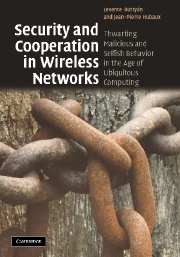 Security and Cooperation in Wireless Networks
Security and Cooperation in Wireless Networks Book contents
- Frontmatter
- Contents
- Preface
- Acknowledgements
- Part I Introduction
- Part II Thwarting malicious behavior
- Part III Thwarting selfish behavior
- 9 Selfish behavior at the MAC layer of CSMA/CA
- 10 Selfishness in packet forwarding
- 11 Wireless operators in a shared spectrum
- 12 Secure protocols for behavior enforcement
- Appendix A Introduction to cryptographic algorithms and protocols
- Appendix B A tutorial on game theory for wireless networks
- References
- Index
10 - Selfishness in packet forwarding
from Part III - Thwarting selfish behavior
Published online by Cambridge University Press: 05 June 2012
- Frontmatter
- Contents
- Preface
- Acknowledgements
- Part I Introduction
- Part II Thwarting malicious behavior
- Part III Thwarting selfish behavior
- 9 Selfish behavior at the MAC layer of CSMA/CA
- 10 Selfishness in packet forwarding
- 11 Wireless operators in a shared spectrum
- 12 Secure protocols for behavior enforcement
- Appendix A Introduction to cryptographic algorithms and protocols
- Appendix B A tutorial on game theory for wireless networks
- References
- Index
Summary
In the previous chapter, we have studied selfish behavior at the MAC layer. We will now focus on the network layer. For this purpose, we will consider self-organized wireless ad hoc networks. As we have explained in Chapter 2, in such networks the networking services are provided by the nodes themselves. As a fundamental example, the nodes must make a mutual contribution to packet forwarding in order to ensure an operable network. If the network is under the control of a single authority, as is the case for military networks and rescue operations, the nodes cooperate for the critical purpose of the network. However, if each node is its own authority, cooperation between the nodes cannot be taken for granted; on the contrary, it is reasonable to assume that each node has the goal of maximizing its own benefits by enjoying network services and at the same time minimizing its contribution. This selfish behavior can significantly damage network performance.
In this chapter, we focus on the most resource demanding operation of the network layer, namely packet forwarding. We address the case of self-organized wireless ad hoc networks, in order to derive some fundamental results. In particular, we will see that a network without incentives for cooperation is very likely to collapse. In Chapter 12, we will describe incentive techniques to solve this problem.
- Type
- Chapter
- Information
- Security and Cooperation in Wireless NetworksThwarting Malicious and Selfish Behavior in the Age of Ubiquitous Computing, pp. 331 - 349Publisher: Cambridge University PressPrint publication year: 2007


